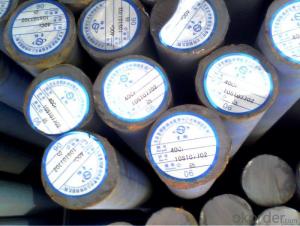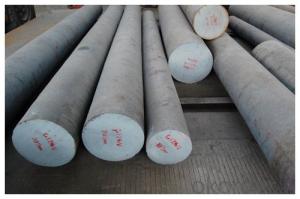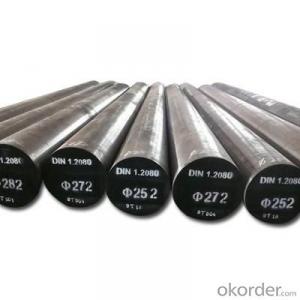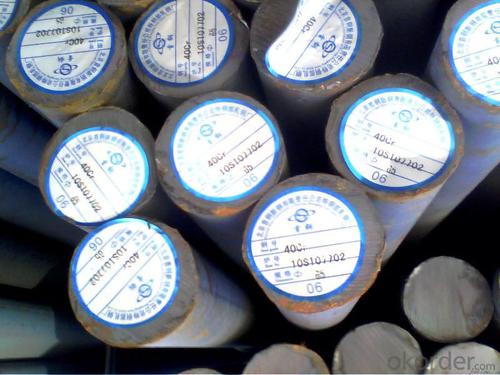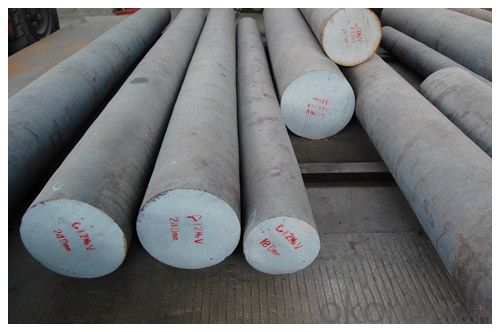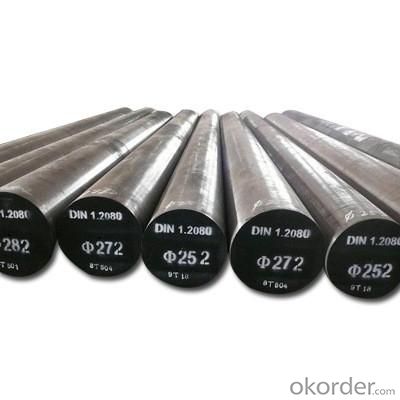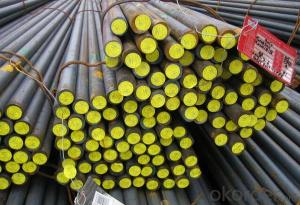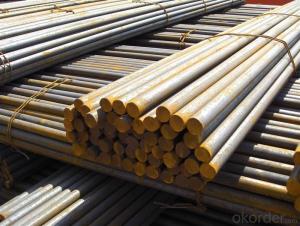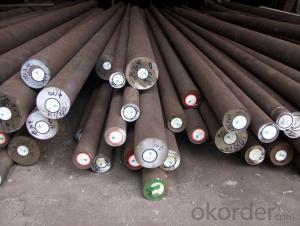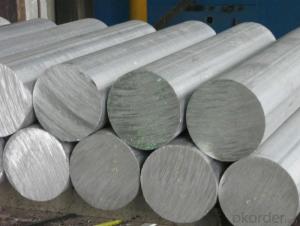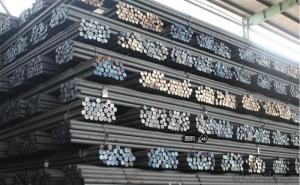Special Steel Alloy Steel Round Bar SCM415
- Loading Port:
- China main port
- Payment Terms:
- TT OR LC
- Min Order Qty:
- 30 m.t.
- Supply Capability:
- 10000 m.t./month
OKorder Service Pledge
OKorder Financial Service
You Might Also Like
Specification
Product Information
1 Standards and Chemical Composition:
GB | AISI | JIS | DIN |
15CrMo | SCM415 | 16CrMo44 |
C | Si | Mn | P | S | Cr | Mo |
0.13-0.18 | 0.15-0.35 | 0.60-0.85 | ≤0.03 | ≤0.03 | 0.9-1.2 | 0.15-0.30 |
2 Mechanical Property:
Yield Strength (MPa) | ≥295 |
Tensile Strength (MPa) | ≥440 |
Elongation (%) | ≥22 |
Hardness (HB) | ≤197 |
Reduction in Area (%) | ≥60 |
AKV (J) | ≥94 |
3 Brief Introduction:
Dimension | 14-350mm |
Length | 2-13m or as per your request |
Delivery condition | Hot rolled |
Heat Treatment | Normalizing, Annealing, Quenching |
Packing | Standard seaworthy packing or according to your requirements |
Product Show
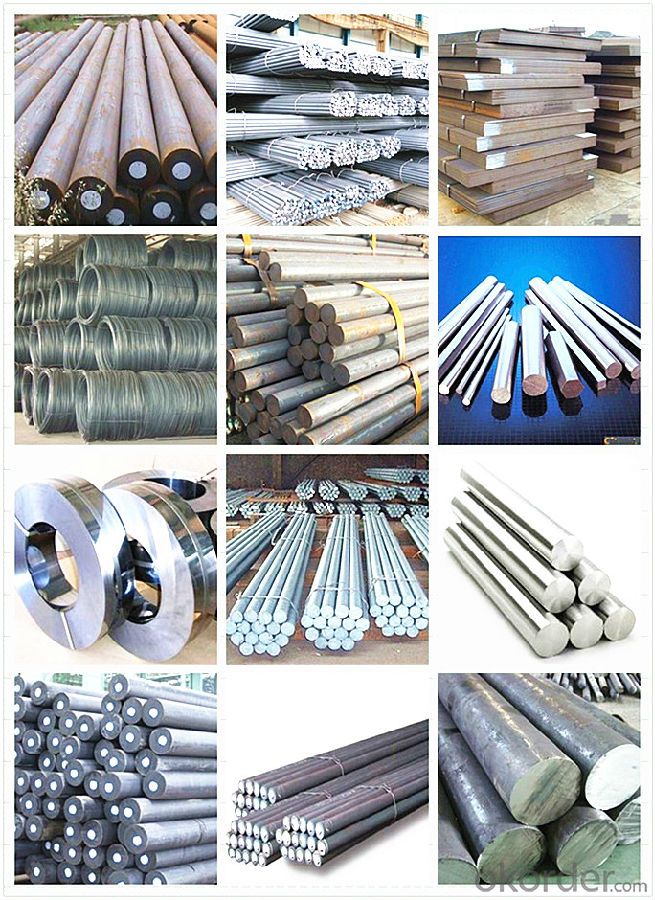
Workshop Show
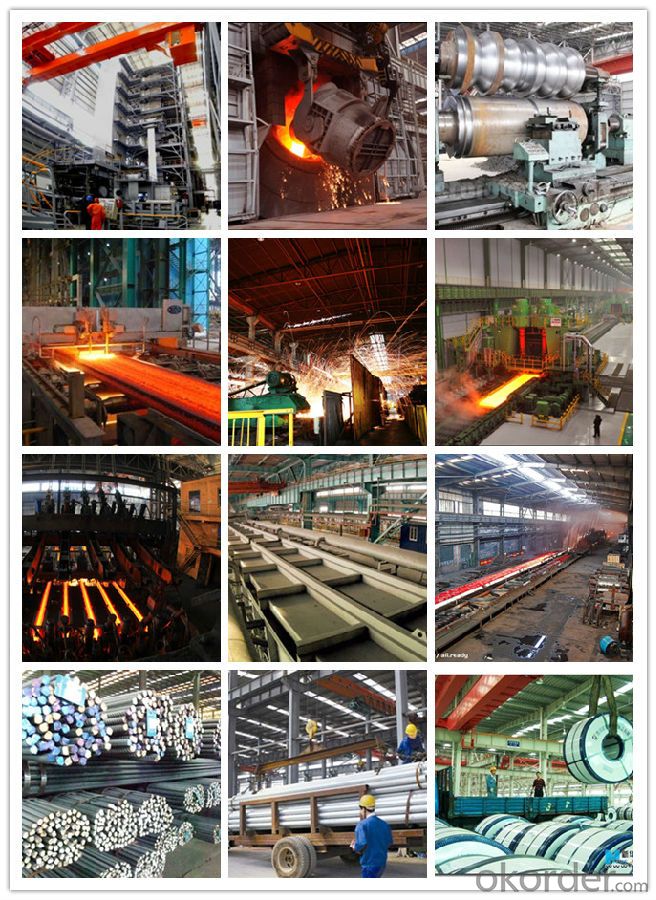
Shipping
1. FedEx/DHL/UPS/TNT for samples, Door-to-Door;
2. By Air or by Sea for batch goods, for FCL; Airport/ Port receiving;
3. Customers specifying freight forwarders or negotiable shipping methods!
Delivery Time: 3-7 days for samples; 5-25 days for batch goods.
Payment Terms
1.Payment: T/T, L/C, Western Union, MoneyGram,PayPal; 30% deposits; 70% balance before delivery.
2.MOQ: 1pcs
3.Warranty : 3 years
4.Package Informations: 1) EXPORT, In 20 feet (GW 25 ton) or 40 feet Container (GW 25 ton)
2)as customer's requirement
Why choose us?
(1) The leading exporter in China special steel industry.
(2) Large stocks for various sizes, fast delivery date.
(3) Good business relationship with China famous factories.
(4) More than 7 years steel exporting experience.
(5) Good after-sales service guarantee.
- Q: What are the different methods of surface texturing for special steel?
- There are several different methods of surface texturing for special steel, each with its own unique advantages and applications. Some of the most common methods include: 1. Shot blasting: This process involves propelling small metal or ceramic particles at high speeds onto the surface of the steel. It removes any impurities or contaminants on the surface, creating a textured finish that improves adhesion for coatings and paints. 2. Acid etching: This method involves immersing the steel in an acidic solution, which selectively removes a thin layer of the surface to create a textured pattern. Acid etching can be used to achieve intricate designs or patterns on the steel surface. 3. Mechanical grinding: This technique involves using abrasive tools to physically grind and remove material from the surface of the steel. It can be used to create a range of textures, from smooth to rough, depending on the grit size of the grinding tool. 4. Laser texturing: This advanced method uses laser technology to create precise and intricate patterns on the surface of the steel. Laser texturing offers high precision and repeatability and can be used to achieve complex designs that are difficult to achieve with other methods. 5. Electrochemical etching: This process involves using an electric current to selectively dissolve the surface of the steel, creating a textured pattern. It can be used to achieve consistent and controlled textures on the steel surface. Each method of surface texturing has its own advantages and limitations, and the choice of method depends on the desired texture, the specific properties of the special steel, and the intended application.
- Q: What are the different surface coating methods used for special steel?
- There are several surface coating methods that are commonly used for special steel to enhance its properties and protect it from various environmental factors. These methods include: 1. Galvanizing: This is a process in which a layer of zinc is applied to the surface of the steel. It provides excellent corrosion resistance and can be done through hot-dip galvanizing or electroplating. 2. Electroplating: In this method, a thin layer of metal such as chromium, nickel, or copper is deposited onto the steel surface through an electrochemical process. This improves the steel's appearance, wear resistance, and corrosion resistance. 3. Powder coating: Powder coating involves applying a dry powder to the steel surface, which is then heated and fused to form a protective layer. It provides excellent durability, weather resistance, and aesthetic appeal. 4. Thermal spray coating: This method involves spraying a molten or heated material onto the steel surface, which then solidifies to form a protective coating. Materials commonly used for thermal spray coating include metals, ceramics, and polymers. 5. Paint coating: Painting is a commonly used method for surface coating. Different types of paints, such as epoxy, polyurethane, or acrylic, can be applied to the steel surface to provide protection against corrosion, chemicals, and UV radiation. 6. PVD coating: Physical Vapor Deposition (PVD) is a process in which a thin film of a material, such as titanium nitride or diamond-like carbon, is deposited onto the steel surface through a vacuum deposition process. PVD coatings enhance hardness, wear resistance, and appearance. 7. Anodizing: Anodizing is primarily used for aluminum, but it can also be applied to special steel. This process involves creating an oxide layer on the steel surface through an electrochemical reaction, which improves corrosion resistance and adds a decorative finish. These surface coating methods are essential for special steel as they provide enhanced protection against corrosion, wear, and other environmental factors, thereby extending the lifespan and improving the performance of the steel. The choice of coating method depends on the specific requirements and desired properties of the steel.
- Q: What are the main applications of special steel in the defense aircraft?
- Special steel is used in defense aircraft for a variety of critical applications. Some of the main applications include structural components, engine components, and armor. Special steel provides high strength and durability, allowing it to withstand extreme conditions and protect the aircraft from impacts and ballistic threats. It also offers excellent heat resistance, corrosion resistance, and fatigue resistance, making it ideal for use in critical areas where safety and reliability are paramount.
- Q: How does special steel perform in chemical resistance applications?
- Special steel performs exceptionally well in chemical resistance applications. It is specifically designed to withstand corrosion, oxidation, and other chemical reactions, making it highly resistant to various corrosive substances. Its unique composition and properties, such as high chromium and nickel content, provide excellent resistance to acids, alkalis, and other aggressive chemicals. This makes special steel an ideal choice for applications in industries such as chemical processing, oil and gas, pharmaceuticals, and food processing, where resistance to corrosion is crucial for long-term durability and safety.
- Q: How does special steel contribute to the defense machinery industry?
- Special steel contributes to the defense machinery industry by providing superior strength, durability, and resistance to corrosion. This type of steel is specifically designed to meet the demanding requirements of military applications, ensuring that defense machinery can withstand harsh environments, extreme temperatures, and heavy use. By utilizing special steel, the defense industry can produce high-performance weapons, vehicles, and equipment that are essential for national security and defense capabilities.
- Q: How does special steel perform in terms of electrical conductivity?
- Special steel generally has low electrical conductivity compared to other metals such as copper or aluminum. This is due to the high carbon content and other alloying elements present in special steel, which impede the flow of electric current. However, certain types of special steel, such as stainless steel, can exhibit better electrical conductivity when compared to regular carbon steel.
- Q: How does special steel contribute to reducing product defects?
- Special steel contributes to reducing product defects by offering superior strength, durability, and corrosion resistance compared to regular steel. This ensures that the components made from special steel are less prone to breakage, wear and tear, or damage during manufacturing, transportation, or usage. Special steel's high-quality characteristics provide a more reliable and consistent performance, resulting in fewer product defects and improved overall product quality.
- Q: How does special steel perform in terms of thermal conductivity?
- Special steel typically has lower thermal conductivity compared to other materials. This means that it is not as efficient in conducting heat and may retain heat for longer periods of time.
- Q: What are the specific requirements for special steel used in the railway track industry?
- The specific requirements for special steel used in the railway track industry are designed to ensure the safety, durability, and efficiency of the tracks. Firstly, the steel used for railway tracks must have a high tensile strength to withstand the heavy loads and constant stress applied by trains. This strength allows the tracks to maintain their shape and prevent deformation, ensuring smooth and stable movement of the trains. Secondly, the special steel used in railway tracks must have excellent wear resistance. As trains constantly traverse the tracks, there is significant friction and wear between the train wheels and the tracks. Therefore, the steel needs to be able to withstand this wear and tear, minimizing the need for frequent maintenance and replacement. Thirdly, the steel used in railway tracks must have good fatigue resistance. Trains exert repetitive loads on the tracks, which can lead to fatigue failure if the steel is not able to withstand this cyclic loading. Fatigue resistance ensures that the tracks remain intact and safe for prolonged periods, reducing the risk of accidents. Furthermore, the steel must have high corrosion resistance to withstand exposure to various environmental and weather conditions. Railway tracks are exposed to moisture, temperature variations, and other corrosive elements, making it crucial for the steel to have the ability to resist rust and corrosion. In addition to these mechanical and physical properties, the steel used in the railway track industry must also meet specific dimensional and geometric requirements. This includes precise dimensions, straightness, and alignment to ensure proper installation and alignment of the tracks, allowing for smooth and safe train operations. Overall, the specific requirements for special steel used in the railway track industry revolve around strength, wear resistance, fatigue resistance, corrosion resistance, and dimensional accuracy. Meeting these requirements is essential to ensure the safety, longevity, and efficiency of railway tracks, facilitating smooth and reliable train transportation.
- Q: How does special steel contribute to the robotics industry?
- Special steel plays a crucial role in advancing the robotics industry in multiple ways. Firstly, special steel alloys possess exceptional mechanical properties, making them ideal for manufacturing various robotic components. These alloys can provide superior strength, durability, and resistance to wear and tear. As a result, robots built with special steel can operate efficiently and reliably in demanding environments, such as manufacturing plants or hazardous locations. Moreover, special steel alloys offer excellent heat resistance and thermal stability. This characteristic is particularly important in the robotics industry, as robots often generate significant heat during operations. Special steel components can withstand high temperatures without deforming or losing their structural integrity. This capability ensures that robots can operate at their optimal performance levels without the risk of mechanical failures caused by heat-related issues. Additionally, special steel's corrosion resistance is highly beneficial for the robotics industry. Robots are increasingly being deployed in diverse applications, including underwater exploration, chemical handling, and outdoor environments. In such cases, exposure to moisture, chemicals, or harsh weather conditions can lead to corrosion and degradation of robot parts. By utilizing special steel alloys, manufacturers can significantly extend the lifespan of robotic systems, reducing maintenance costs and enhancing their overall reliability. Furthermore, special steel's magnetic properties make it invaluable in the development of magnetic sensors and actuators used in robotics. These sensors enable robots to detect and interact with their surroundings, enhancing their autonomy and adaptability. Magnetic actuators, on the other hand, enable precise control and movement in robotic systems. Special steel's magnetic properties contribute to the efficiency, accuracy, and responsiveness of these components, enabling robots to execute complex tasks with precision. Overall, special steel plays an integral role in the robotics industry by providing the necessary materials for manufacturing robust, high-performance, and versatile robotic systems. From enhancing strength and durability to withstanding extreme conditions, special steel alloys contribute to the advancement of robotics by ensuring the reliability, efficiency, and functionality of these machines.
Send your message to us
Special Steel Alloy Steel Round Bar SCM415
- Loading Port:
- China main port
- Payment Terms:
- TT OR LC
- Min Order Qty:
- 30 m.t.
- Supply Capability:
- 10000 m.t./month
OKorder Service Pledge
OKorder Financial Service
Similar products
Hot products
Hot Searches
Related keywords
